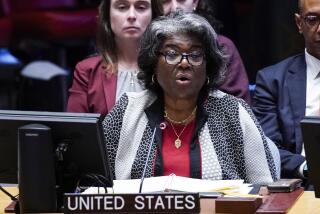Shevardnadze Urges Intense Mideast Bid : Mediation: Ex-Soviet foreign minister wants Security Council to concentrate on the Arab-Israeli conflict.
MOSCOW â Former Soviet Foreign Minister Eduard A. Shevardnadze, urging new efforts for a broad Middle East peace in the wake of the Persian Gulf War, proposed in an interview published today that the U.N. Security Councilâs permanent members now begin intense collaboration on the Arab-Israeli conflict.
Shevardnadze, now head of the new Soviet Foreign Policy Assn., also called for the appointment of a special U.N. mediator to help begin an Arab-Israeli dialogue--and left the impression with senior Western diplomats that he might be a candidate for the position.
And, breaking the restrictions on him while he was foreign minister, Shevardnadze called for the immediate and unconditional restoration of full diplomatic relations between the Soviet Union and Israel, a move he said Moscowâs Arab friends will have to accept if they want effective Soviet participation in the peace process.
Shevardnadze, speaking last week in an interview with The Times, warned that, once again, crucial momentum toward a broad Mideast peace is being lost despite ârelatively favorable conditionsâ for resolution even of âthe main problem, the most sensitive, the sharpest--the Arab-Israeli conflict.â
âI am already worried by this pause, this hiatus,â Shevardnadze said, reflecting on the weeks that have passed since the end of the war, the lengthy efforts required to agree on a cease-fire resolution and the failure, so far, to broaden the diplomatic effort to the whole Middle East. âThe hot wave of violence is over . . . but, so far, the process is not progressing. . . .
âThis is highly important to preserve the momentum . . . so that while all the impressions and horrors of war are still fresh in the memory, people will think, âWhere are the guarantees that tomorrow another conflict wouldnât start?â It is now very important to act in a more dynamic fashion, more courageously.â
Shevardnadze suggested that the Security Council, which formulated the international response to the Gulf crisis, should now focus in a similar way on the Arab-Israeli conflict.
He proposed that the councilâs five permanent members--Britain, China, France, the Soviet Union and the United States--cooperate in opening a dialogue with all those involved in the conflict and that âa very authoritative politicianâ be appointed as mediator.
Shevardnadzeâs boldness on some crucial issues, his circumspection on others and the timing of his proposal led several Western ambassadors, who know him well and remain in touch, to speculate that he saw himself as that U.N. mediator.
âShevardnadze has the trust of the Americans, and he is working hard on the Israelis,â a European ambassador commented. âThe Soviet Union retains an immense presence in the Arab world, it has great stature in Europe . . . and . . . the man has greater negotiating experience now than almost anyone. It is very tempting to say, âLet him have a go.â â
Aside from praising President Bushâs renewed support of territory-for-peace as an approach to a settlement and Secretary of State James A. Baker IIIâs exploratory trip through the Middle East this month, Shevardnadze refrained deliberately from taking a stand on the issues in the conflict, such as a Palestinian state, or insisting on a specific forum for negotiations, such as the international conference that Moscow had long advocated.
âIf we donât go ahead with the conference, letâs proceed on a bilateral basis or use intermediaries or use any other means to force the opposing sides to renounce their mutual non-recognition and ignoring of the other forces, including the Palestine Liberation Organization,â he said. âIf we do not act, the dialogue will never start.â
Shevardnadze, anxious that the Soviet Union be a full partner with the United States in Middle East diplomacy, called for restoration of full diplomatic relations with Israel, broken by Moscow in the 1967 Arab-Israeli war. The lack of relations, he argued, had cut Moscow out of past diplomacy and reduced its effectiveness in the Middle East.
âThe time has come, a new stage is beginning, when even our Arab friends should understand that this normalization of Soviet-Israeli relations is dictated by the times,â he said. âIf (the Arabs) are interested in our participation . . . in the process of establishing peace, then they should support what I am saying now about the renewal of relations between us and Israel.â
As foreign minister, Shevardnadze had brought Moscowâs relations with Israel back to the consular level and held regular consultations with Israeli officials, but he was unable to remove the weakened but remaining Soviet condition that Israel agree, at least in principle, to participate in a future Middle East peace conference.
Reviewing Soviet-American relations, Shevardnadze said they had passed a crucial test during the Gulf crisis when the superpower âpartnershipâ held despite some strains on both sides. Now, Moscow and Washington face the task of building a broader, deeper concord.
âThe degree and reliability of strategic stability (in the world) depends, first of all, on Soviet-American relations and, ahead of everything else, on their mutual understanding,â Shevardnadze said. âWe must, as I see it, conduct a serious dialogue not only on the reduction of existing arms, but we must also discuss seriously . . . how much armament we really need to guarantee the security of our countries and that of our friends, neighbors and allies and to ensure that others do not overtake us.
âWe need this conversation . . . (and), although it seems like fantasy, I am sure that the time will come, if we maintain this course, when we will seriously discuss these matters.â Shevardnadze, who resigned three months ago to protest what he saw as a growing danger of a reactionary coup dâetat and a right-wing dictatorship in the Soviet Union, accused conservatives here of seriously undermining the countryâs foreign policy gains.
âThey want to demonstrate that perestroika was begun and pursued by incompetent people, that they consistently made concessions and yielded ground and that it was not only inside the country that they led the state toward catastrophe but in foreign policy, too,â he said of the charges against him and other reformers.
âToday, we are facing chaos--we are on the very brink of the abyss. If all this had happened amid a continuing arms race, if we had to find additional resources, and not only financial resources, to develop more and more kinds of weapons and, if we were denied the opportunity to reduce our armaments and the cost of maintaining our armed forces, we would be in a complete and total disaster.â
More to Read
Sign up for Essential California
The most important California stories and recommendations in your inbox every morning.
You may occasionally receive promotional content from the Los Angeles Times.










